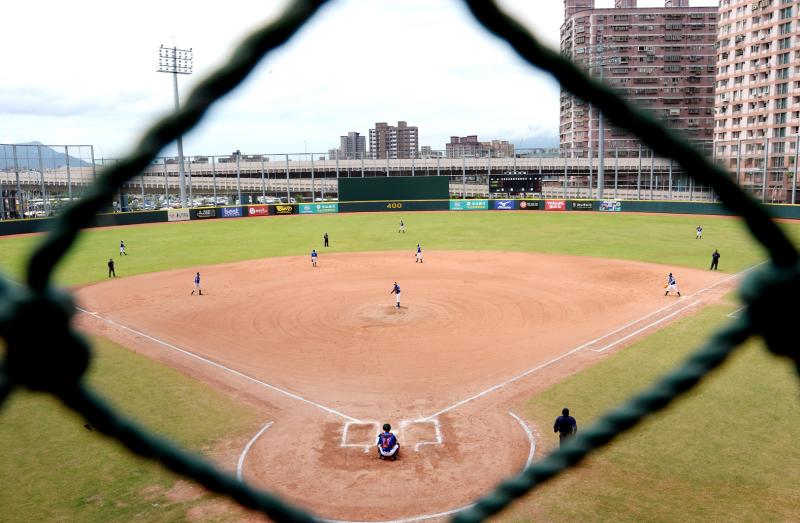Taiwan’s baseball league is continuing as a trailblazer for sports resuming after the lockdown in the coronavirus pandemic.
An easing last weekend allows more fans at the ballparks, allows them to sit closer together and consume food and drinks while they’re supporting their teams in the Taiwanese CPBL.
Masks are optional, when seated.

Photo: Lin Cheng-fang
The Taiwan league resumed play in April in empty stadiums while elite sports globally were still in lockdown, and last month started allowing up to 1,000 fans to attend games under strict social distancing measures.
On Sunday, after the government again loosened its COVID-19 restrictions, fans were only required to wear surgical face masks when they weren’t in their seats, and the stadiums were allowed to be up to 50 percent full of fans.
The CPBL is continuing to observe limited social distancing by ordering a one-seat gap be maintained between fans.
The lifting of restrictions was welcomed at Tuesday’s game between the defending CPBL champion Rakutan Monkeys and the visiting Uni-Lions in Tainan.
CHEERING WITHOUT MASKS
Monkeys fan Martha Chen said she could now cheer as much as she wants without a mask. The Uni-Lions held off a ninth inning rally to beat the defending CPBL champions 7-6.
“From now on, we don’t have to wear a mask when we watch a baseball game at the stadium. This allows me to shout out loud as much as I want to cheer for my team,” the 31-year-old Chen, an air transport worker, said. “And my kid would not bother me with taking the mask off. Kids find it hard to wear a mask.”
Uni-Lions pitcher Logan Darnell said the easing of restrictions on fans made it feel “a lot more like a baseball game.”
“Everybody is excited that there’s less restrictions on the fans coming in. They make us feel a lot more normal than what is was beforehand,” Darnell said. “You had a certain amount of people that can come in, and everybody was spread out. And even before that, when there was nobody in the stands, that was just a different ... different feel. But now that everybody is back and the restrictions are kind of less, it’s going feel a lot more like a baseball game for sure.”
Taiwan, which has had 433 COVID-19 cases among a population of 23 million, limited the spread by imposing flight restrictions and through contact tracing of anyone who comes near a confirmed patient.
Elite sports leagues are gradually resumed in some countries, mostly without fans in stadiums or with very small crowds under strict physical distancing restrictions.

April 14 to April 20 In March 1947, Sising Katadrepan urged the government to drop the “high mountain people” (高山族) designation for Indigenous Taiwanese and refer to them as “Taiwan people” (台灣族). He considered the term derogatory, arguing that it made them sound like animals. The Taiwan Provincial Government agreed to stop using the term, stating that Indigenous Taiwanese suffered all sorts of discrimination and oppression under the Japanese and were forced to live in the mountains as outsiders to society. Now, under the new regime, they would be seen as equals, thus they should be henceforth

With over 100 works on display, this is Louise Bourgeois’ first solo show in Taiwan. Visitors are invited to traverse her world of love and hate, vengeance and acceptance, trauma and reconciliation. Dominating the entrance, the nine-foot-tall Crouching Spider (2003) greets visitors. The creature looms behind the glass facade, symbolic protector and gatekeeper to the intimate journey ahead. Bourgeois, best known for her giant spider sculptures, is one of the most influential artist of the twentieth century. Blending vulnerability and defiance through themes of sexuality, trauma and identity, her work reshaped the landscape of contemporary art with fearless honesty. “People are influenced by

Last week, the the National Immigration Agency (NIA) told the legislature that more than 10,000 naturalized Taiwanese citizens from the People’s Republic of China (PRC) risked having their citizenship revoked if they failed to provide proof that they had renounced their Chinese household registration within the next three months. Renunciation is required under the Act Governing Relations Between the People of the Taiwan Area and the Mainland Area (臺灣地區與大陸地區人民關係條例), as amended in 2004, though it was only a legal requirement after 2000. Prior to that, it had been only an administrative requirement since the Nationality Act (國籍法) was established in

The remains of this Japanese-era trail designed to protect the camphor industry make for a scenic day-hike, a fascinating overnight hike or a challenging multi-day adventure Maolin District (茂林) in Kaohsiung is well known for beautiful roadside scenery, waterfalls, the annual butterfly migration and indigenous culture. A lesser known but worthwhile destination here lies along the very top of the valley: the Liugui Security Path (六龜警備道). This relic of the Japanese era once isolated the Maolin valley from the outside world but now serves to draw tourists in. The path originally ran for about 50km, but not all of this trail is still easily walkable. The nicest section for a simple day hike is the heavily trafficked southern section above Maolin and Wanshan (萬山) villages. Remains of